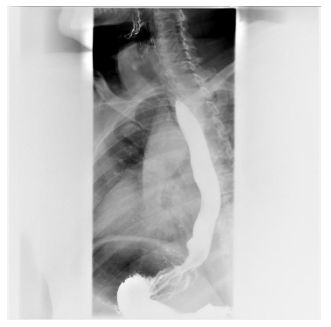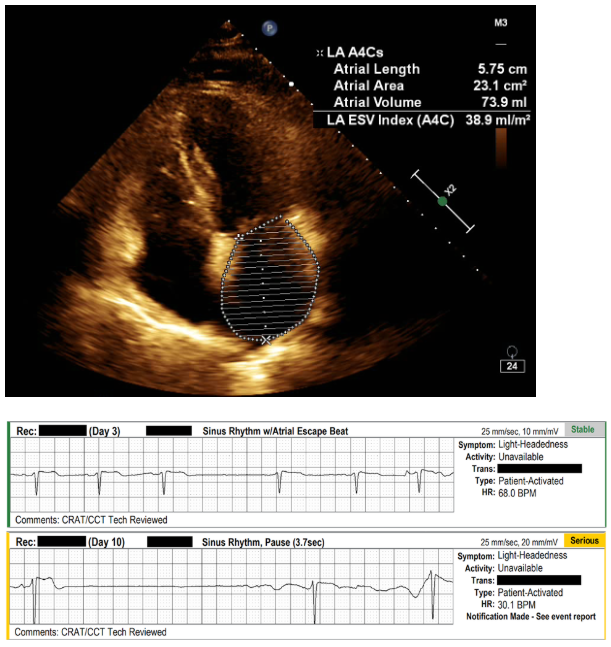Sunday Poster Session
Category: Esophagus
P0773 - Deglutition Syncope Without Esophageal Abnormalities Successfully Treated With Dual-Chamber Pacemaker Implantation: A Case Report
Sunday, October 26, 2025
3:30 PM - 7:00 PM PDT
Location: Exhibit Hall
- YH
Yusuf Omar Hallak, MD (he/him/his)
The University of Toledo
Toledo, OH
Presenting Author(s)
Award: ACG Presidential Poster Award
Yusuf Omar Hallak, MD1, Bisher Sawaf, MD2, Shahem Abbarh, MD3, Nsreen Shahrour, BS4, Muhamad Oum, MD5, Mulham Alom, MD6, Sana Rabeeah, MD1, Umberto Battistin, MD1, Aya Akhras, MD7, Amine Rakab, MD8, Wael Dahhan, MD9
1The University of Toledo, Toledo, OH; 2University of Toledo Medical Center, Toledo, OH; 3Georgetown University MedStar Health, Baltimore, WA; 4Georgetown University School of Medicine, Toledo, OH; 5Saint Agnes Medical Center, Fresno CA, Fresno, CA; 6Internal Medicine, Southern Illinois University School of Medicine, Springfield, IL; 7HCA Florida Aventura Hospital, Aventura, FL; 8Division of Medical Education, Weill Cornell Medicine, Doha, Ad Dawhah, Qatar; 9Detroit Medical Center/Wayne State University, Detroit, MI
Introduction: Deglutition syncope is a rare, vagally-mediated reflex syncope triggered by swallowing, causing bradyarrhythmia and cerebral hypoperfusion. Diagnosis is challenging and may require ECG monitoring during meals. Management includes dietary changes, medications, and pacemaker implantation. Dual-chamber pacing is effective, especially in recurrent cases. This report presents a rare case successfully treated with a pacemaker despite no esophageal abnormalities.
Case Description/
Methods: A 65-year-old man presented with a one-year history of recurrent syncope and presyncope triggered by eating or drinking, especially when eating rapidly. Symptoms included lightheadedness, nausea, and near-fainting, without dysphagia. His history included controlled diabetes, hyperlipidemia, GERD, and a myeloproliferative disorder. Workup revealed a small sliding hiatal hernia and GERD, with normal ECG, echocardiogram, and myocardial perfusion imaging. A 30-day Holter monitor showed sinus pauses up to 3.7 seconds, linked to swallowing. A dual-chamber pacemaker was implanted. At one-month follow-up, all symptoms had resolved.
Discussion: Deglutition syncope is a rare, reflex-mediated condition characterized by swallowing-induced bradyarrhythmia, most often affecting older adults with a slight male predominance. It may be triggered by both solids and liquids, especially when consumed rapidly, and frequently lacks prodromal symptoms. The pathophysiology involves an exaggerated vagal reflex via esophageal mechanoreceptors leading to cardioinhibition—manifesting as sinus pauses, AV block, or even asystole. Diagnosis hinges on clinical suspicion and documentation of swallowing-associated arrhythmias using Holter monitoring or event recorders, as routine ECG and imaging are typically normal. A significant subset of patients has structural esophageal or cardiac abnormalities, though many remain idiopathic. Management includes lifestyle modification, avoiding triggers, and in persistent or high-risk cases, dual-chamber pacemaker implantation, which has shown high success rates. Evaluation for treatable esophageal causes, such as hiatal hernia or achalasia, is essential, as their correction may resolve symptoms. For younger or pacemaker-averse patients, emerging therapies like cardioneuroablation offer promising, device-free alternatives.

Figure: Figure 1 - XR-Esophagography (double contrast technique) revealing a small sliding hiatal hernia identified by the gastroesophageal junction positioned slightly above the diaphragm level. The image shows no evidence of esophageal strictures or other structural abnormalities

Figure: Figure 2a - Transthoracic Echocardiogram, Apical 4-Chamber View, showing a slightly enlarged left atrial chamber.
Figure 2b - Holter Monitor Trace showing two recorded episodes of sinus pauses accompanied by escape atrial beats, occurring concurrently with near-fainting episodes while the patient was eating. This illustration captures critical moments that support the diagnosis of deglutition syncope, the longest pause lasting 3.7 seconds
Disclosures:
Yusuf Omar Hallak indicated no relevant financial relationships.
Bisher Sawaf indicated no relevant financial relationships.
Shahem Abbarh indicated no relevant financial relationships.
Nsreen Shahrour indicated no relevant financial relationships.
Muhamad Oum indicated no relevant financial relationships.
Mulham Alom indicated no relevant financial relationships.
Sana Rabeeah indicated no relevant financial relationships.
Umberto Battistin indicated no relevant financial relationships.
Aya Akhras indicated no relevant financial relationships.
Amine Rakab indicated no relevant financial relationships.
Wael Dahhan indicated no relevant financial relationships.
Yusuf Omar Hallak, MD1, Bisher Sawaf, MD2, Shahem Abbarh, MD3, Nsreen Shahrour, BS4, Muhamad Oum, MD5, Mulham Alom, MD6, Sana Rabeeah, MD1, Umberto Battistin, MD1, Aya Akhras, MD7, Amine Rakab, MD8, Wael Dahhan, MD9. P0773 - Deglutition Syncope Without Esophageal Abnormalities Successfully Treated With Dual-Chamber Pacemaker Implantation: A Case Report, ACG 2025 Annual Scientific Meeting Abstracts. Phoenix, AZ: American College of Gastroenterology.
Yusuf Omar Hallak, MD1, Bisher Sawaf, MD2, Shahem Abbarh, MD3, Nsreen Shahrour, BS4, Muhamad Oum, MD5, Mulham Alom, MD6, Sana Rabeeah, MD1, Umberto Battistin, MD1, Aya Akhras, MD7, Amine Rakab, MD8, Wael Dahhan, MD9
1The University of Toledo, Toledo, OH; 2University of Toledo Medical Center, Toledo, OH; 3Georgetown University MedStar Health, Baltimore, WA; 4Georgetown University School of Medicine, Toledo, OH; 5Saint Agnes Medical Center, Fresno CA, Fresno, CA; 6Internal Medicine, Southern Illinois University School of Medicine, Springfield, IL; 7HCA Florida Aventura Hospital, Aventura, FL; 8Division of Medical Education, Weill Cornell Medicine, Doha, Ad Dawhah, Qatar; 9Detroit Medical Center/Wayne State University, Detroit, MI
Introduction: Deglutition syncope is a rare, vagally-mediated reflex syncope triggered by swallowing, causing bradyarrhythmia and cerebral hypoperfusion. Diagnosis is challenging and may require ECG monitoring during meals. Management includes dietary changes, medications, and pacemaker implantation. Dual-chamber pacing is effective, especially in recurrent cases. This report presents a rare case successfully treated with a pacemaker despite no esophageal abnormalities.
Case Description/
Methods: A 65-year-old man presented with a one-year history of recurrent syncope and presyncope triggered by eating or drinking, especially when eating rapidly. Symptoms included lightheadedness, nausea, and near-fainting, without dysphagia. His history included controlled diabetes, hyperlipidemia, GERD, and a myeloproliferative disorder. Workup revealed a small sliding hiatal hernia and GERD, with normal ECG, echocardiogram, and myocardial perfusion imaging. A 30-day Holter monitor showed sinus pauses up to 3.7 seconds, linked to swallowing. A dual-chamber pacemaker was implanted. At one-month follow-up, all symptoms had resolved.
Discussion: Deglutition syncope is a rare, reflex-mediated condition characterized by swallowing-induced bradyarrhythmia, most often affecting older adults with a slight male predominance. It may be triggered by both solids and liquids, especially when consumed rapidly, and frequently lacks prodromal symptoms. The pathophysiology involves an exaggerated vagal reflex via esophageal mechanoreceptors leading to cardioinhibition—manifesting as sinus pauses, AV block, or even asystole. Diagnosis hinges on clinical suspicion and documentation of swallowing-associated arrhythmias using Holter monitoring or event recorders, as routine ECG and imaging are typically normal. A significant subset of patients has structural esophageal or cardiac abnormalities, though many remain idiopathic. Management includes lifestyle modification, avoiding triggers, and in persistent or high-risk cases, dual-chamber pacemaker implantation, which has shown high success rates. Evaluation for treatable esophageal causes, such as hiatal hernia or achalasia, is essential, as their correction may resolve symptoms. For younger or pacemaker-averse patients, emerging therapies like cardioneuroablation offer promising, device-free alternatives.

Figure: Figure 1 - XR-Esophagography (double contrast technique) revealing a small sliding hiatal hernia identified by the gastroesophageal junction positioned slightly above the diaphragm level. The image shows no evidence of esophageal strictures or other structural abnormalities

Figure: Figure 2a - Transthoracic Echocardiogram, Apical 4-Chamber View, showing a slightly enlarged left atrial chamber.
Figure 2b - Holter Monitor Trace showing two recorded episodes of sinus pauses accompanied by escape atrial beats, occurring concurrently with near-fainting episodes while the patient was eating. This illustration captures critical moments that support the diagnosis of deglutition syncope, the longest pause lasting 3.7 seconds
Disclosures:
Yusuf Omar Hallak indicated no relevant financial relationships.
Bisher Sawaf indicated no relevant financial relationships.
Shahem Abbarh indicated no relevant financial relationships.
Nsreen Shahrour indicated no relevant financial relationships.
Muhamad Oum indicated no relevant financial relationships.
Mulham Alom indicated no relevant financial relationships.
Sana Rabeeah indicated no relevant financial relationships.
Umberto Battistin indicated no relevant financial relationships.
Aya Akhras indicated no relevant financial relationships.
Amine Rakab indicated no relevant financial relationships.
Wael Dahhan indicated no relevant financial relationships.
Yusuf Omar Hallak, MD1, Bisher Sawaf, MD2, Shahem Abbarh, MD3, Nsreen Shahrour, BS4, Muhamad Oum, MD5, Mulham Alom, MD6, Sana Rabeeah, MD1, Umberto Battistin, MD1, Aya Akhras, MD7, Amine Rakab, MD8, Wael Dahhan, MD9. P0773 - Deglutition Syncope Without Esophageal Abnormalities Successfully Treated With Dual-Chamber Pacemaker Implantation: A Case Report, ACG 2025 Annual Scientific Meeting Abstracts. Phoenix, AZ: American College of Gastroenterology.

